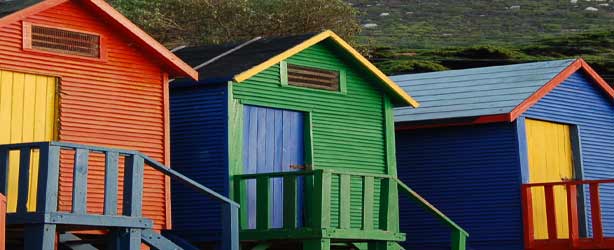One night free at this this fully-catered retreat in Winelands
Cape Town Issues White Shark Alerts
Seasonal increase in great white shark activity in Cape Town waters
The City of Cape Town has issued an urgent warning to all beach and ocean users of the seasonal increase in white sharks along Cape Town’s in-shore areas."Although white sharks are present in our waters all year round, we are approaching the time of the year when the possibility of encountering one of these animals is much greater," says Gregg Oelofse of the Cape Town’s Environmental Resource Management Department.
"Over the past five years, the period of mid August to end September has recorded the highest numbers of interactions between white sharks and recreational users.
"The Shark Working Group would thus urge people using the ocean near Cape Town to be extra vigilant over the next few months when the highest occurrence of inshore white shark activity is expected.
The Cape Town City Council recently adopted a five year funding programme for the shark spotting programme, which is unique in the world.
(Monday, 20 August 2007), shark spotters recorded a shark sighting at Fish Hoek beach just after midday - the first in the area in months. A shark was also seen on Saturday 18 August 2007 near Sonwabe beach, halfway between Strandfontein and Muizenberg.
"People are encouraged to use areas where shark spotters are on duty and to ask them about recent sightings and activity. They should also read the shark spotting signs and acquaint themselves with the four flag warning system and use of a siren to close off the beach," says Oelofse.
Shark spotting programmes currently operate seven days a week, from 8am to 6pm, at Muizenberg corner, St James beach, Fish Hoek and Noordhoek (The Hoek). From October the shift will be extended to 7pm.
From September, shark spotters will also be on duty from 10am to 6pm on weekends, school holidays and public holidays, at Monwabisi beach, Mnandi beach, Blue Waters beach and Clovelly Corner.
From 1 December, they will be monitoring Glencairn Beach daily from 10am to 7pm. These operational times coincide with lifesaving operational times.
Molo Says: Yes Great White Sharks can be dangerous, but in reality you must realise that less then one person a year is bitten by a shark world wide.
In fact more people die from eating sharks anually than there is people being eaten by sharks.
If you’re not doing any crazy things such as swimming in open seas with bleeding wounds, and watching out for signs put in place by the Cape Town environmental resources department and exercised a little caution, avoiding potentially suspect areas, and listening to the officials on duty you should be in absolutely no danger of any contact with sharks, certainly not when swimming on any of the tourist beaches. Its worth noting that these “spottings” are for the most part very isolated cases.
Sharks are a glorious part of Cape Town's rich aquatic ecosystem. And their existence deserves a respectful understanding.
If you want a closer look at these magnificent white sharks then try one of our tailored made adrenalin pumping white shark cage diving experiences with CapeTownMagazine.com, watch the shark cage diving video or dive with sharks with scuba gear at the Two Oceans Aquarium .
Discover Cape Town and South Africa: subscribe to our free newsletter.









